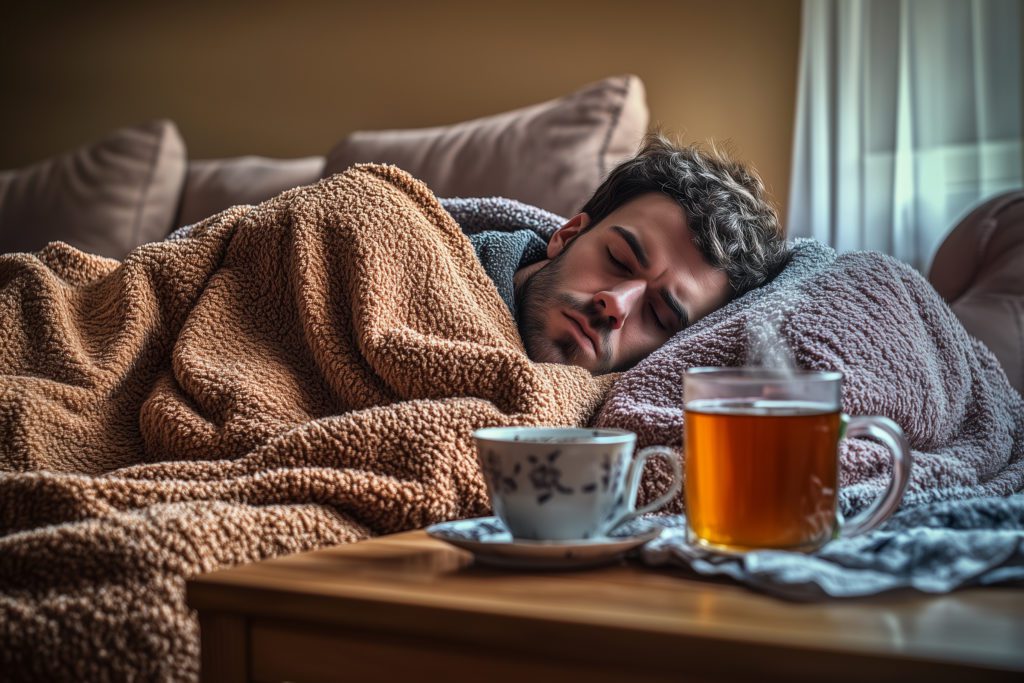
Sleeping Soundly During Illness: How to Support Your Immune System When You're Sick
Feeling under the weather? Learn how to support your body’s immune system while you’re sick, ensuring you get quality rest and recover soon.

When you’re sick, it can be difficult to get sleep at times, but it is essential that you prioritize your rest. The quality of our rest and our health are deeply intertwined, as studies have shown that getting less sleep or experiencing sleep disturbances can actually lead to infections and chronic diseases. Fortunately, there are some things you can do to encourage better sleep to support your immune system while you’re sick.
We’ll explore how to sleep soundly during your illness, including more about how to create a sleep-conducive environment, how to adjust your bedtime routine, and even how to use some sleep aids, if needed. We’ll also talk about how you can continue to support your immune system with proper sleep by focusing on effective napping, hydration, adequate nutrition, and even stress-relieving activities.
Because of how deeply our sleep and health are connected—especially in terms of our immune system—it is essential that we prioritize quality rest. Let’s discuss some of the things you can do to improve your sleep quality while you’re sick first!
How to Improve Your Sleep Quality While Sick
No matter, if you have the flu, a stubborn cold, or another type of illness, supporting quality rest, will always be a great idea so you can recover faster and improve how you feel. Improving your sleep quality while ill starts with three things: creating the right environment for sleep, adjusting your bedtime routines, and even using sleep aids if needed to help you get enough rest.
1. Create an Environment Primed for Rest
To ensure that you get enough rest, you’ll have to eliminate distractions and disturbances. If you can and you have your own space, this would involve reducing the bedroom temperature, ensuring it is dark enough, and also reducing the amount of noise you hear or are exposed to.
Studies on healthy individuals showed that lowering the bedtime temperature and improving ventilation helped with sleep quality for the elderly, and similar effects are likely for those who are ill, too.
2. Adjust Your Bedtime Routine
While you might have a sound bedtime routine, you might struggle with getting to bed while sick regardless. You can make changes—even just temporarily—to ensure that you get relaxed enough for rest.
Some people like to take a bath, while others may go with a massage, especially for those who are deprived of sleep and struggle to feel ready for sleep (Source: ProQuest). So, don’t be afraid to add in an additional relaxing activity to help you wind down, as it can help you rest more soundly.
3. Leverage Sleep Aids If Needed
With many nighttime medications you might be prescribed, you might actually take sleep aids as part of your recovery. Even if you are not given these substances, they can help you a great deal.
Items like herbal teas, saline nasal sprays, or even over-the-counter medications can help you rest more and feel relaxed enough for your body to repair itself overnight.
Other Tips to Support Your Immune System Through Proper Sleep
Improving your sleep quality is all about supporting your body’s ability to rest, but there are several other things you can do to help your immune system. Even if you do not get enough rest overnight, you can take steps to emphasize rest and recovery.
From taking naps to ensuring that you’re engaging in stress-relieving activities, you can use a blend of methods to ensure you feel your healthiest in no time. Here are some further tips to help you support your immune system by getting proper sleep.
1. Take Naps at the Right Times
A nap can be restorative for anyone who struggles with poor-quality sleep, especially shift workers. However, when you’re sick, naps can also be beneficial to your recovery. Studies have shown this over the years, including one article in Brain, Behavior, and Immunity that showed how taking a midday nap helped to improve alertness and bring leukocyte counts back to baseline levels. This is important because leukocytes are a sign of your body’s inflammation, so napping can help you limit this while you recover.
2. Nourish and Hydrate Your Body
Even if you create the right setting for sleep and take steps to relax, you’ll struggle to sleep if you’re not taking care of yourself. This goes beyond just sleeping and taking medication; it also relates to your hydration and what you’re eating.
If you eat healthy, you’ll feel better and support your body’s recovery, but you should also avoid eating late at night if you can help it. This could extend sleep duration and increase your wake after sleep onset, so you don’t enjoy as much rest.
3. Practice Relaxation Techniques
Whenever you are sick, you’ll likely experience inflammation, which is a sign of your cells’ distress. However, if you find ways to relax, you can help your body focus on healing rather than attacking whatever virus, bacteria, or fungi you may be fighting.
By using methods like deep breathing exercises, meditation, and gentle stretching, you can encourage your body’s relaxation. And by doing so, you might sleep more, which has been shown to help reduce inflammation. The more quality sleep you get, the more reduced your inflammation will be.
Prioritize Your Sleep and Encourage Speedier Recovery from Illness
While you’re sick, you can take steps to enjoy better rest to help support your immune system. With sleep as such an important part of our immunity, the tips we have described can help you tenfold, no matter what illness you may be experiencing.
As always, if you are concerned about your situation and feel you may be getting even more sick, contact a medical professional to receive more support for your condition. For more articles on the latest insights from the field of sleep health, visit our website today to read more.

Written by
Marie Soukup
Marie Soukup is a seasoned copywriter, editor, and Integrative Nutrition Health Coach with a certificate from the Institute of Integrative Nutrition (IIN). With years of experience working with brands across diverse industries, Marie is passionate about holistic health and crafting compelling content.
Download Pillow
Get help
Press & News
Legal
Connect
X (Twitter)
Company
Copyright © Neybox Digital Ltd.



